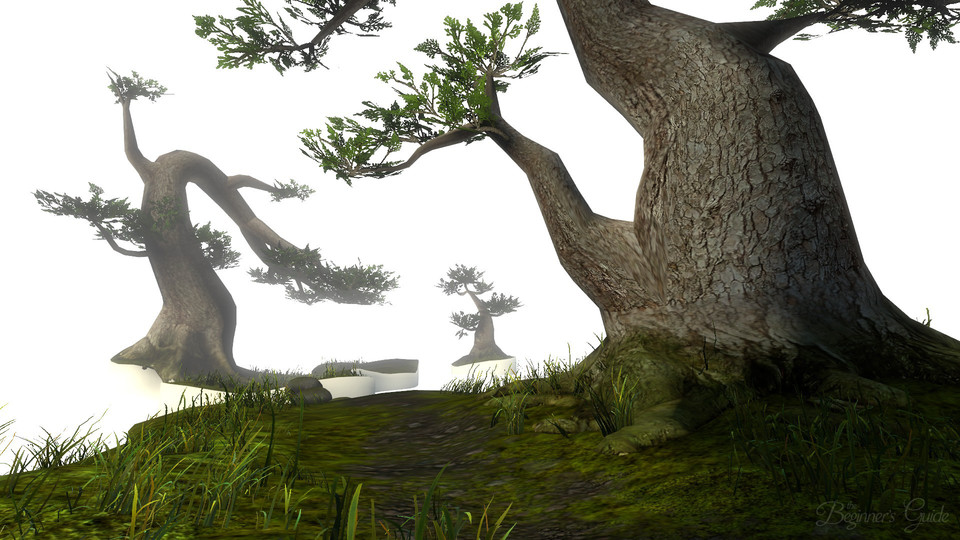Someday you’ll figure it out, and when you do, don’t talk about it.
The Beginner’s Guide is one of the most powerful games I’ve played in a long time. Make that one of the most powerful experiences I’ve ever had, full stop. It’s not fun, per se, it’s not even a traditional game at all, as much as one of the most potent empathy engines I’ve ever found. It’s a brief but explosive hour that requires no skill or gaming knowledge, so if you’re open to new experiences at all, go play it and come back when you’re done. I’ll wait.
…
To the brave few of you who heeded my plea, bravo. To the rest, you curious idle silent majority: I understand. That door is still open. Until then, bear with me. I have to talk about it.
The Beginner’s Guide is a game about depression, first and foremost. Games usually avoid difficult themes like depression, and on the rare occasions when they do try, they’re often clumsy and tone deaf, but Beginner’s Guide nails it. I think this matters because I’m a huge believer in empathy. When we stretch outside our comfort zone, when we try to understand how different people feel and think and experience the world, we have more compassion, less fear, and more tolerance and willingness to work together toward common goals. That’s a big deal.
I’ve never really been depressed. I know it’s real, painful, and often crippling, but I can’t empathize easily because it’s never crippled me personally. I’m lucky. However, through Beginner’s Guide I’ve now had some experience, however shallow and brief, of what it might be like. Now, when I talk with someone who’s been depressed, I’m less likely now to toss off a “why didn’t you just snap out of it?” or “come on, you didn’t have anything to be depressed about.” I can listen and relate a bit more.
Beginner’s Guide works in the other direction, too. When you have a problem, it’s easy to feel like you’re alone, like no one else has been through what you’re going through and relates to how you feel. It’s lonely and isolating, and you naturally pull back from other people, which feeds the vicious cycle and leaves you feeling even more alone.
Works like Beginner’s Guide are powerful antidotes to this. Reaching out to a friend may seem intimidating, even impossible; playing a game, reading a book, or watching a movie may be much more doable. A game that shows you you’re not alone after all, that other people have the same problem and have even overcome it, can be a stepping stone out of the vicious cycle. Beginner’s Guide is that game.
It’s many other games, too, and I can’t help but gush over them all. Stick with me, and spoiler alert: if you have even the slightest inkling you might play it, bookmark this post and come back after you’re done.
Beginner’s Guide is a cutting screed on the relationship between author and reader and the way modern internet fan culture has taken new ownership of creative works, both to their benefit (fan fiction, cons and online communities, Joss Whedon’s browncoats) and their detriment (Gamergate, internet shaming, rewriting Mass Effect 3‘s ending). Roland Barthes’s Death of the Author may be the definitive academic point of view, but Beginner’s Guide is a poignant and moving depiction of the real life human experience of being loved to death for your work by a literal “whisper machine.”
It’s an impassioned plea to give creative works room to breath, to allow them some ambiguity and let people interpret them on their own. Modern fans have a tendency to suck all the oxygen out of the conversation, smothering creators with admiration, demanding black and white answers when none exist, and shouting their own so loudly that they poison the well for everyone else. More tragically, the flood of attention is often also a death of a thousand cuts for the author themselves, whether just their creative wellspring or something deeper.
It’s a heartbreaking warning to other creators to beware the siren song of success and external validation. Praise easily becomes an addiction, an ever stronger need to feed the beast until even 10/10 reviews and Game of the Year nominations leave them numb and anything less digs a pit of despair deeper and deeper.
It’s a chilling portrayal of codependence, of people drawn to rescue and and fix and help so relentlessly that their subjects withdraw further and further from real recovery. An unreliable narrator and the deft, subtle reveals here are particularly effective, bringing to mind Misery, Memento, and above all kindred spirit Braid‘s stunning finale.
And finally it’s a fragile ray of hope, using images that would be clichéd anywhere else – closing one door and opening another, death and resurrection, escaping an impossible maze – but here manage to land effortlessly time after time.
The Beginner’s Guide is not a normal game. I can’t say it was fun, or that I enjoyed it, precisely…but I may be a better person, ever so slightly, for having played it. You can be too. Ready? Go.




if you’ve played it and you’re now itching for more, the Gamers With Jobs spoiler podcast is a great no-holds-barred discussion. personal experiences, academic deconstruction, game industry analysis, and more.
Thanks for posting this — bought it and played it on your recommendation.